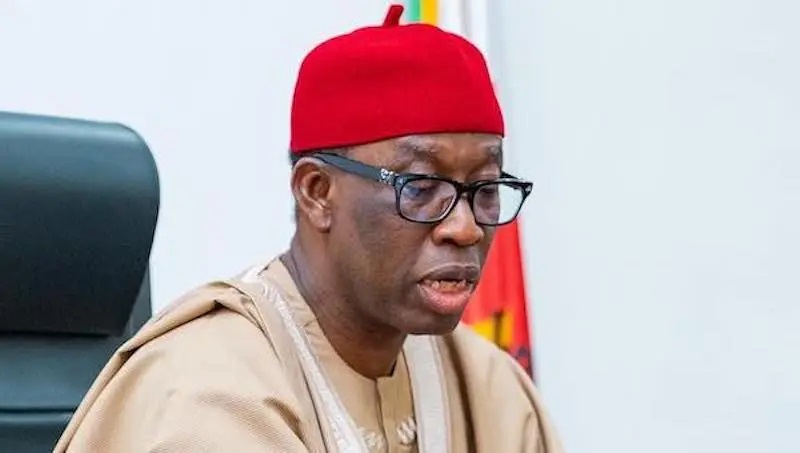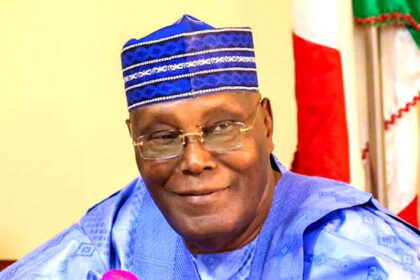…His political future now hangs in the balance
The presidential election is over. The chickens have come home to roost. Perhaps Nigeria’s most fractious presidential election in the Fourth Republic, Bola Tinubu, a former governor of Lagos State and the standard bearer of the All Progressives Congress, APC, was declared the winner by the Independent National Electoral Commission, INEC. Coming a distant second was the People’s Democratic Party, PDP’s Atiku Abubakar.
What was supposed to be a two-horse race between the two political gladiators saw Peter Obi of the Labour Party giving them a run for their money, popularity, and political sagacity. Obi came third after winning in PDP and APC strongholds, including Lagos and Delta States. Now, this is the crux of the matter.
Governor Ifeanyi Okowa of Delta State is Atiku’s running mate. His emergence as running mate was one of the factors that balkanised the PDP going into the election. The VP slot was a straight battle among three candidates; Governor Nyesom Wike of Rivers State, who came second in the presidential primary of the PDP; Governor Emmanuel Udom of Akwa Ibom State and Okowa. Wike felt he deserved to be on the ticket alongside Atiku considering, among other factors, that he came second in the primaries; and is widely reputed to have kept the party afloat and alive since 2015 while Atiku idled away in Dubai.
After the PDP primaries in May 2022, the party constituted a Vice Presidential Candidate Screening Committee (VPSC) comprising the former governor of Kogi State, Capt. Idris I. Wada (rtd); former minister of aviation, Chief Osita Chidoka; Rt. Hon. Binta Bello, Chief Mrs. Alh. Mutiat Adedoja, Rt. Hon. Austin Opara, Prof. Aisha Madawaki, Mrs. Ayotunde George-Ologun, Chief Mrs. Chidiebelu Mofus, and Fidelis Tapgun. High Chief Tom Ikimi chaired the committee, while Dr. Akilu Indabawa was the secretary.
Though the committee unanimously opted for Wike, Atiku reportedly went against that decision and unilaterally chose Okowa. Informed sources said that this decision was predicated on Okowa’s alleged financial contributions to the former Vice President’s bid for the ticket; and the latter’s aversion to Wike’s legendary truculence and verbosity. Wike didn’t take kindly to this, and he went haywire with the backing of his group of four other governors – Seyi Makinde (Oyo), Samuel Ortom (Benue), Ifeanyi Ugwuanyi (Enugu), and Okezie Ikpeazu (Abia).
As governor of one of Nigeria’s richest states, Okowa flung open his personal vaults to bankroll the presidential election. He spent money like a drunken sailor believing that his payday was nigh. He even went above and beyond fiscal prudence to prosecute the election. Last January, the Delta State government sought and got the approval of the House of Assembly for a N100billion loan, which it explained away as ‘a discounting facility from a commercial bank’. But the Delta APC governorship candidate, Senator Ovie Omo-Agege, warned banks to desist from giving the state loans otherwise, it would be considered a free-will donation to the state. Okowa got the loan regardless. Noteworthy also is that prior, the state government had got N240 billion in refunds from the federating account. Reports have it that most of these funds went into funding the election. His party has now gone to court to challenge Tinubu’s victory.
In the meantime, it bears stating that Okowa planted seeds that would provide food for himself and his family in his declining years. But the weather has turned dangerously, leaving his orchard an unhealthy yield. With the electoral loss, he is understandably experiencing a disorienting sadness and a debilitating disappointment in which he feels at once isolated and frozen.
The expression of mere empathy and pathos may not be enough to assuage the deep-seated feelings of betrayal and disappointment that now envelope the toothy governor. He is at that precarious point in life when the dream sustaining all other dreams has flickered out.
Okowa’s problems are, however, legion. Back home in Delta, he faces the biggest political battle of his life. Next Saturday, March 11, governorship elections will hold across the country. Okowa has fallen out with his godfather and benefactor, former Governor James Ibori. Indeed, Okowa is one of the major beneficiaries of Ibori’s far-reaching political influence. A medical doctor by profession, Okowa had served as a commissioner, secretary to the state government, senator, and two-term governor, all thanks to Ibori’s influence. During the governorship primary of 2015, former Governor Emmanuel Uduaghan tried imposing his candidate on the party, but Ibori ensured that Okowa got it.
A bad student of history, perhaps; for the 2023 governorship primary, Okowa went headlong into a proxy supremacy battle with Ibori. David Edevbie, his former chief of staff, was Ibori’s choice. Edevbie lost the primary election to Okowa’s candidate, Speaker of the state House of Assembly, Sheriff Oborevwori, by 590 to 113 votes. Ibori was bruised but not battered. For daring his former boss and political mentor, it was clear that the battle line has been drawn. But Okowa denied that there was friction in the family, saying, “I want to tell you that the Ibori political family is intact and nothing has changed. We are only playing politics, which is normal in the electioneering period. What you are seeing now is politics.”
If it was mere politics for Okowa, it is about life and his eventual survival as a man and a politician for Ibori. Edevbie went to court to challenge Oborevwori’s candidacy. He lost at the Appeal and Supreme Courts. Invariably, Okowa won the battle, but will he win the war next Saturday? The godfather, who had been silent all along, is lurking. With depleted resources, the surging popularity of the Labour Party, a divided house, and the APC’s presidential victory, Okowa’s political future hangs precariously in the balance.




